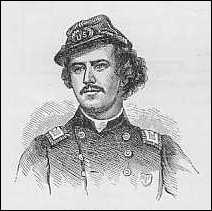Home | News | Books | Speeches | Places | Resources | Education | Timelines | Index | Search
Letter to Ephraim D. and Phoebe Ellsworth
Washington, D.C.
May 25, 1861
President Abraham Lincoln wrote this letter of condolence to the parents of Colonel Elmer Ellsworth the day after his assassination in Alexandria, Virginia. As Union troops occupied the town, Ellsworth was shot after he took down a huge secession flag atop the Marshall House, a small hotel on King Street. For weeks the flag had been visible in Washington, including from Lincoln's second-floor White House office.
Ellsworth became acquainted with the Lincoln family only a short time before his death. He joined Lincoln's office in Springfield, Illinois, to study law, campaigned for him in 1860 and helped manage his inaugural journey. He also became a close friend of the president's White House secretaries. One of them remarked that Lincoln grieved Ellsworth like a son, and this letter gives a hint of this emotional attachment.
David Homer Bates of the War Department Telegraph Office said he gave Lincoln the telegram announcing Ellsworth's death. Bates saw Lincoln frequently because the War Department building, located west of the White House, offered the closest telegraph connection to his office -- and consequently, the latest war news. In his classic book, Lincoln in the Telegraph Office, Bates wrote, "The entire letter shows the great man's sympathy with human sorrow and his close reliance upon God, which traits appear like golden threads running all through his published utterances and were exhibited in his every-day walk and conversation."
To the Father and Mother of Col. Elmer E. Ellsworth:
My dear Sir and Madam, In the untimely loss of your noble son, our affliction here, is scarcely less than your own. So much of promised usefulness to one's country, and of bright hopes for one's self and friends, have rarely been so suddenly dashed, as in his fall. In size, in years, and in youthful appearance, a boy only, his power to command men, was surpassingly great. This power, combined with a fine intellect, an indomitable energy, and a taste altogether military, constituted in him, as seemed to me, the best natural talent, in that department, I ever knew. And yet he was singularly modest and deferential in social intercourse. My acquaintance with him began less than two years ago; yet through the latter half of the intervening period, it was as intimate as the disparity of our ages, and my engrossing engagements, would permit. To me, he appeared to have no indulgences or pastimes; and I never heard him utter a profane, or intemperate word. What was conclusive of his good heart, he never forgot his parents. The honors he labored for so laudably, and, in the sad end, so gallantly gave his life, he meant for them, no less than for himself.
In the hope that it may be no intrusion upon the sacredness of your sorrow, I have ventured to address you this tribute to the memory of my young friend, and your brave and early fallen child.
May God give you that consolation which is beyond all earthly power. Sincerely your friend in a common affliction --
A. Lincoln
Source: Collected Works of Abraham Lincoln, edited by Roy P. Basler et al.The following is a reply written to President Lincoln from Colonel Ellsworth's father:
Mechanicville June 19." 1861
Dear Sir
Pardon us the long delay in answering your kind and sympathizing letter. It has not occurred through want of inclination to write, but from the many calls made upon our time. The fact that Elmer succeeded in gaining the love & esteem of those with whom he was associated is to us one of great joy, and the reception of a letter, expressing such sentiments, from one whom we all so much respect is highly gratifying
It would be useless for us to attempt to describe our feelings upon the receipt of the sad news of Elmers death. Although the blow was severe, how severe God only knows, yet through his goodness & mercy we are enabled to say "thy will not ours be done" The sympathy of all true Christians, and lovers of that country in whose defence he perished has done much to assuage the intensity of our grief We sincerely believe that God has removed him from a life of strife to one of eternal peace.
He was indeed toward us all you represented him, kind loving & dutiful Our present comfort and future happiness always seemed uppermost in his mind. But he is gone and the recollections of his goodness alone is left us. We trust he did not die in vain, but that his death will advance the cause in which he was engaged.
With these few words accept our most grateful thanks for your kindness to and interest you have shown in our beloved son May it never repent you,
We would always be pleased to hear from you
We are with respect
Yours &c
E. D. Ellsworth,
Source: Abraham Lincoln Papers, Library of Congress
Home | News | Education | Timelines | Places | Resources | Books | Speeches | Index | Search Lincoln's writings are in the public domain; this introduction © 2020 Abraham Lincoln Online. All rights reserved. Privacy Policy

